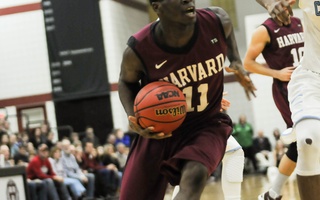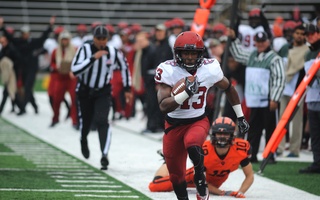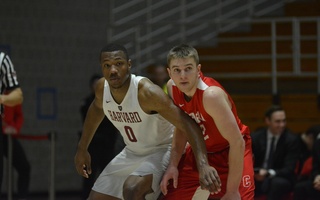{shortcode-18a62e41bfd4cbbd22b8777823866178c7484d54}Glancing up above the concrete bleachers of Harvard Stadium at the conclusion of the third quarter, one might have thought that the scoreboard was not displaying the Harvard–Princeton game. Tigers 10, Crimson 7 was the tally at the end of three. For a team that had averaged 52 points over its first five contests, Princeton was struggling mightily and Harvard was within striking distance in a crucial Ivy League battle.
That all changed in the fourth quarter, as the contest quickly devolved into a gunslinging battle between the pair of offenses.
With 48 seconds remaining in the game, the Crimson pulled within eight points courtesy of a toe-tap touchdown to Tyler Adams in the back right corner of the end zone. With two timeouts remaining — not enough to prevent Princeton from wasting the rest of the clock — Harvard sent out its onside kicking unit for the second time of the quarter.
The kick from Jonah Lipel bounded twice but fell right into the waiting arms of a Tigers special teamer. Just like that, Harvard’s longshot bid to forge a comeback was all for naught.
With three knees to run the clock down, Princeton solidified a tight 29-21 decision. Despite the loss, the Crimson (3-3, 1-2 Ivy) played the Tigers (6-0, 3-0) better than any of their prior opponents had to this point. Princeton’s 29 points represented far less than its previous low of 45 against Columbia, and Harvard’s 22 marked the first time any opponent had posted more than 10 against the visitors.
“You take away the late score and I’m not sure we could’ve played any better defensively,” Harvard coach Tim Murphy said. “I use the word heroically. That’s how well we played. That’s how hard we played.”
Before the Adams touchdown, there was a near identical situation to allow the Crimson to cut the Tigers’ lead to 22-14. Bolstered by a favorable pass interference call on a fourth and 10 chance, senior quarterback Tom Stewart ultimately aired out a deep pass to senior receiver Henry Taylor, who corralled the ball, tapped his heel, and fell backwards out of the end zone.
{shortcode-602917acee13184e985dd9dfd111c31e7a1f2366} Along with that pass interference, Princeton accumulated seven total penalties after recording just 14 in its first five games.
“At the end of the day, we’ve got to be more disciplined and that’s something we preach,” Princeton coach Bob Surace said. “Those things against a team that’s as disciplined and as good as Harvard, that’s the recipe for a tough day.”
Harvard’s hopes were quickly dashed following the Taylor touchdown as well. An onside kick attempt from Lipel failed to regift possession to his offense. Two plays later, running back Charlie Volker exploded for a 49-yard score to put the Tigers up by 15.
A penalty against the home team at the outset of the final frame proved costly. Princeton opted to keep its offense on the field on fourth and four. Quarterback John Lovett targeted receiver Stephen Carlson, who missed the pass but got wrapped up with defensive back Bennett Bay near the goal line. Pass interference, first down.
Lovett capitalized on the mistake, as he let loose a bullet toward the end zone. Jesper Horsted, cutting right to left, funnelled the pass into his hands and fell to the ground for the touchdown. After a blocked point-after attempt, the Tigers extended their lead to 16-7.
On the Crimson’s next drive, Princeton jumped all over a reeling Harvard team. Stewart found Taylor for a short completion on their own end of the field, but defensive back TJ Floyd pried the ball from the wideout’s grasp, and defensive tackle Jake Strain smothered the ball to give the Tigers possession at their opponent’s 29. However, the Crimson halted the visitors’ progress by driving it back eight yards and forcing a punt.
Taylor’s turnover did not lead directly to points, but it was one of two on the day for the senior wideout, and the first one was much more influential. On a long drive that started at the endpoint of the first quarter, the Crimson marched down to the Tigers’ 23. Looking to erase the zero on its end of the scoreboard, Harvard opted for a double reverse pass. Taylor fired to Jack Cook at the goal line, but his pass sailed into double coverage and Floyd came down with the jump ball. Instead of seven points for the home team, the visitors marched downfield to tack on three.
The third quarter took on a completely different character from the 19-14 fourth. Neither team advanced into the red zone throughout the stanza, and the defenses have completely outshined the offensive units. On its first two drives of the third, the Princeton offense gained 13 combined yards. The second series was punctuated by a sack from Crimson defensive end Scott Garrison for a loss of nine.
{shortcode-f19d79d677b998b38747a1d20c2a80d14ae3e4ff}On Harvard’s first offensive chance of the period, the Tigers’ defense responded and quieted the home crowd. Two snaps of the three and out resulted in Stewart collapsing to the ground on sacks. By the end of the third quarter, the teams combined for six punts on six drives. Princeton narrowly won the game’s sack battle, 4-3.
Crucial to the Crimson’s limiting of the Tigers to just 10 points through three quarters was its third-down defense. Coming into the tilt, Princeton’s offense ranked third in the nation in third-down percentage (53 percent). It succeeded on just five of 18 third-down tries.
“Their safeties were coming up and when we had the box blocked, the safeties came up and they were tackling us for four yard gains,” Surace said. “Third downs in particular there were some fights. It was a matter of inches on both sides.”
Two consecutive plays early in the second quarter summarized the usually electrifying Princeton offense. On the first snap, Horsted appeared to have dropped a pass, but reached out with his left hand as he was hit to salvage the completion. The next play, Lovett faced pressure and bobbled the ball. Rather than play it safe, Lovett pulled the ball up from between his legs and fired a long bomb to Horsted, who made a leaping two-handed catch.
Unsurprisingly, Horsted was Lovett’s favorite target. The senior tandem connected for 126 yards in the air. In this game, Lovett — wearing a large cast on his left arm — relied more on his arm than on his feet, as he carried the ball just 45 yards, his season low.
“We were just aware he could tuck it and run at any time, so we made sure we stayed and played assignment and sound football so that when it came time and he tucked it and ran, we had someone in position to make a play,” captain Zach Miller said.
Despite the theatrics, the Crimson’s defense held strong and curtailed the visitors’ momentum, limiting the Tigers to three points on that possession. After 30 minutes of play, Princeton’s 10 points marked its lowest first-half output all season. In fact, the Tigers scored more than 10 points in the second quarter alone in each of their first five games. Strong stands by the defensive line were especially useful — defensive tackle Stone Hart tackled Lovett twice for losses.
Later in the second quarter, a read option delivered for the home side. Harvard marched down to the Tigers’ five yard line on the strength of completions to Adam Scott and runs by Aaron Shampklin. On first and goal, Shampklin received a wildcat snap, fooled nearly everyone in the stadium with a fake handoff to B.J. Watson, and took the ball himself for the score. The Crimson pulled within a field goal, and it managed to maintain that deficit heading into the locker room.
{shortcode-a07fb80e7551a012665aac9de31859c735dde807}On Princeton’s first drive of the game, it appeared as though Harvard had a chance to stop the Tigers’ potent offense early on. The first two plays saw Lovett brought down behind the line of scrimmage and then throw an incompletion. However, Lovett regrouped for two consecutive first downs, and ultimately the dual threat signal caller took the ball 33 yards on fourth-and-one for a touchdown to open the scoring.
Stewart struggled in the first 30 minutes of play, facing immense pressure from the opposing defensive line. He finished the half 4-for-12 for 42 yards, but a number of completions to Scott (34 yards) set up Harvard’s first touchdown. Stewart regrouped in the second half, finishing 19-of-35 for 223 yards and two touchdowns. The senior field general spread out his targets, as each of Adams, Scott, and Taylor finished with over 40 yards in the air.
“You wonder if we should play two minute offense all the time,” Murphy said. “Very impressed with [Stewart’s] composure and his ability to throw the deep ball…. I think the bottom line is they were playing a lot of prevent defense, and we took advantage of that and we got behind them a couple times.”
The backfield carried the offensive attack until the fourth quarter. By the end of the game, Shampklin had racked up 123 yards.
—Staff writer Jack Stockless can be reached at jack.stockless@thecrimson.com.
Read more in Sports
Men's and Women's Tennis To See Tough Competition This Weekend
















